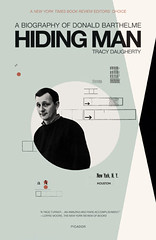 Iris Murdoch’s novels were deeply informed — if not consciously shaped — by her readings in philosophy. Walker Percy found a theoretical framework for his fiction in Kierkegaard, who also influenced Kafka.
Iris Murdoch’s novels were deeply informed — if not consciously shaped — by her readings in philosophy. Walker Percy found a theoretical framework for his fiction in Kierkegaard, who also influenced Kafka.
And Donald Barthelme urged his students to choose their “literary fathers” carefully, and to be well-versed in philosophy. Hiding Man, Tracy Daugherty’s biography, suggests that reading Beckett and the existentialists gave Barthelme confidence that the kind of stories he wanted to write were possible.
Don dropped by Guy’s Newsstand…. and found a copy of Theatre Arts. In it was Waiting for Godot. He stood there and read the whole thing.
That evening, when he took Helen out to dinner, he brought the magazine with him. She had already read the play. “I found it exciting but did not see the implications for Don,” she says. “He was deeply moved and ecstatic about the language…. Each time we were in a bookstore after this, Don looked for work by Beckett and immediately read whatever he found. It seemed that from the day he discovered Godot, Don believed he could write the fiction he imagined.” It would be heavily ironic, and he could “use his wit and intellect in a way that would satisfy him.”
Of course, Don’s breakthrough wasn’t that easy. “The problem is … to do something that’s credible after Beckett, as Beckett had to do something that was credible after Joyce,” he said years later.
Initially, though, the excitement! Waiting for Godot showed Don that philosophy could become drama, almost directly, without the interference of plot, setting, and so on. By stripping away fiction’s stock devices, Beckett focused on consciousness. He could animate the intentionality at the heart of awareness….
[H]is discovery of Beckett and his philosophical studies were guiding him away from vague attempts at an “unlove” story. He was forming a firmer aesthetic. He grounded his magazine editing in philosophy, too, especially in existentialism as it evolved under John Paul Sartre.
I’m fascinated and inspired by this interconnectedness, but also a little wary of it. Whenever I notice philosophy or politics creeping too overtly into my fiction, I think of Jimmy Chen’s succinct dismissal of novels whose didactic agendas overshadow their artistic ones (though I do love Brave New World — or did, the last time I read it. 1984 too, but it doesn’t hold up as well in my memory). Your comments are welcome.
See also Murdoch’s Existentialists and Mystics, in which she imagines Socrates saying “In philosophy, if you aren’t moving at a snail’s pace, you aren’t moving at all”; In defense of Big Ideas in fiction; and Wolcott on Barthelme.